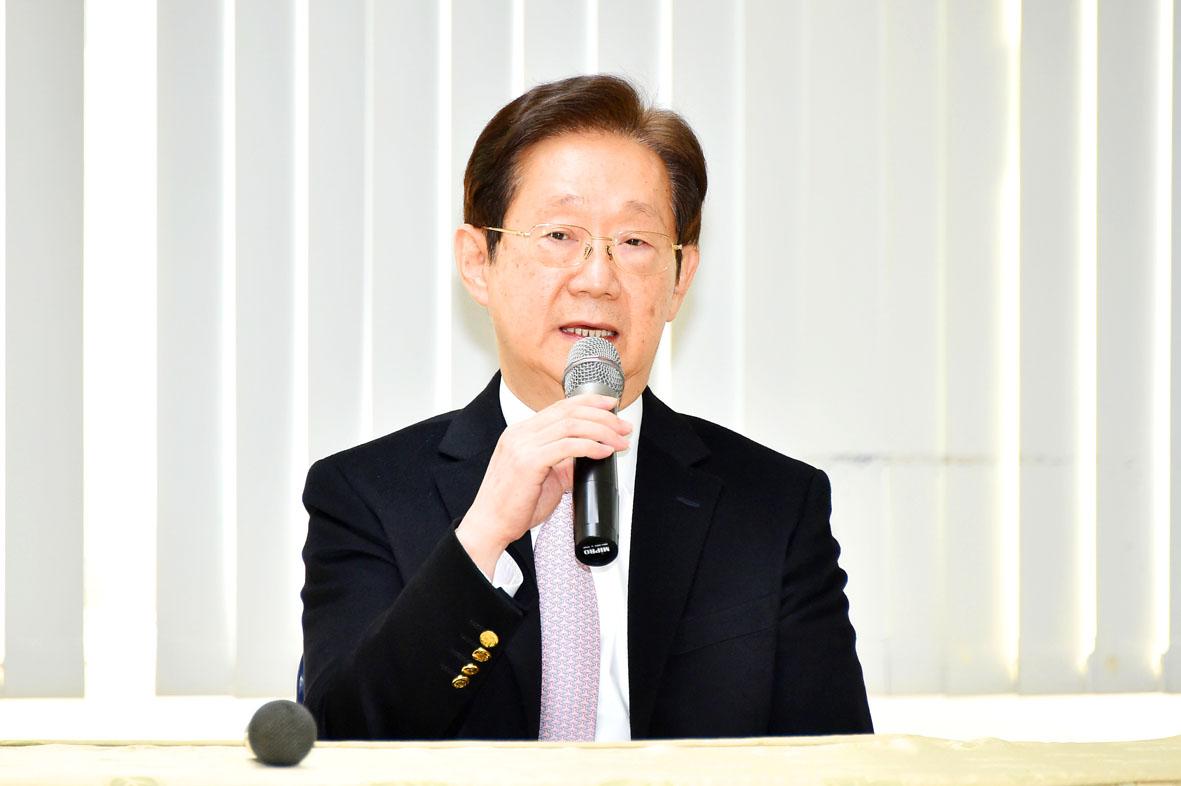After just 50 days on the job, Tatung Co (大同) chairman Lin Wen-yuan (林文淵) has been dismissed.
Lin made the announcement at a news conference in Taipei yesterday, saying that he “does not know exactly why myself” the reason for his tenure being cut short.
Lin said that he had “minor differences of opinion” with Tatung’s leading investor, Shanyuan Group (三圓建設) chairman Wang Kuang-hsiang (王光祥), who informed Lin on Monday last week that he would be replaced.

Photo: Tu Chien-jung, Taipei Times
“I asked him why. What did I do wrong? He said: ‘Nothing, but it’s now a different time with different circumstances,’” said Lin, describing a conversation with Wang.
When asked to name a point of friction with Wang, Lin said that Wang wants to be Tatung vice chairman.
“He mentioned it at the very first board meeting. I told him it was on the table, but we have to amend some company by-laws first,” Lin said.
“As the largest shareholder, Wang thought his suggestion should be accepted, but there are possible legal ramifications,” he said.
Lin said that he did not know who would take over at Tatung, but an announcement is scheduled for today.
His picks for Tatung president, Tang Cheng-jen (湯政仁) and chief financial officer Chen Ming-nan (陳明男), have already tendered their resignations.
The Chinese-language Mirror Media weekly reported that Lin’s choices for president were questioned by former Tatung chairwoman Lin Kuo Wen-yen (林郭文艷), who remains on the board, citing lack of experience.
Tang was an assistant professor of electrical engineering at Tatung University for 17 years before founding a start-up, SourceTec Co (思源資訊).
Lin Wen-yuan, who is also chairman of Eastern Broadcasting Co (東森電視), said that he had “given it my all” in his effort to turn around the beleaguered company after being made chairman on Nov. 2.
He was brought in by Wang after a group of activist investors led by Wang wrested control of the company away from Lin Kuo Wen-yen, the last representative of the founding Lin family at Tatung.
At a news conference last month announcing Lin Wen-yuan’s appointment as chairman, he and Wang promised that it would be “a new Tatung” and the end of years of boardroom drama.
However, the relationship between the two has been “irreparably ruptured” by arguing over Tatung’s management, reports have said.
“It is not as bad as that, but it might be difficult for us to work together in the future,” Lin Wen-yuan said.

Hon Hai Precision Industry Co (鴻海精密) yesterday said that its research institute has launched its first advanced artificial intelligence (AI) large language model (LLM) using traditional Chinese, with technology assistance from Nvidia Corp. Hon Hai, also known as Foxconn Technology Group (富士康科技集團), said the LLM, FoxBrain, is expected to improve its data analysis capabilities for smart manufacturing, and electric vehicle and smart city development. An LLM is a type of AI trained on vast amounts of text data and uses deep learning techniques, particularly neural networks, to process and generate language. They are essential for building and improving AI-powered servers. Nvidia provided assistance

GREAT SUCCESS: Republican Senator Todd Young expressed surprise at Trump’s comments and said he expects the administration to keep the program running US lawmakers who helped secure billions of dollars in subsidies for domestic semiconductor manufacturing rejected US President Donald Trump’s call to revoke the 2022 CHIPS and Science Act, signaling that any repeal effort in the US Congress would fall short. US Senate Minority Leader Chuck Schumer, who negotiated the law, on Wednesday said that Trump’s demand would fail, while a top Republican proponent, US Senator Todd Young, expressed surprise at the president’s comments and said he expects the administration to keep the program running. The CHIPS Act is “essential for America leading the world in tech, leading the world in AI [artificial

DOMESTIC SUPPLY: The probe comes as Donald Trump has called for the repeal of the US$52.7 billion CHIPS and Science Act, which the US Congress passed in 2022 The Office of the US Trade Representative is to hold a hearing tomorrow into older Chinese-made “legacy” semiconductors that could heap more US tariffs on chips from China that power everyday goods from cars to washing machines to telecoms equipment. The probe, which began during former US president Joe Biden’s tenure in December last year, aims to protect US and other semiconductor producers from China’s massive state-driven buildup of domestic chip supply. A 50 percent US tariff on Chinese semiconductors began on Jan. 1. Legacy chips use older manufacturing processes introduced more than a decade ago and are often far simpler than

Gasoline and diesel prices this week are to decrease NT$0.5 and NT$1 per liter respectively as international crude prices continued to fall last week, CPC Corp, Taiwan (CPC, 台灣中油) and Formosa Petrochemical Corp (台塑石化) said yesterday. Effective today, gasoline prices at CPC and Formosa stations are to decrease to NT$29.2, NT$30.7 and NT$32.7 per liter for 92, 95 and 98-octane unleaded gasoline respectively, while premium diesel is to cost NT$27.9 per liter at CPC stations and NT$27.7 at Formosa pumps, the companies said in separate statements. Global crude oil prices dropped last week after the eight OPEC+ members said they would